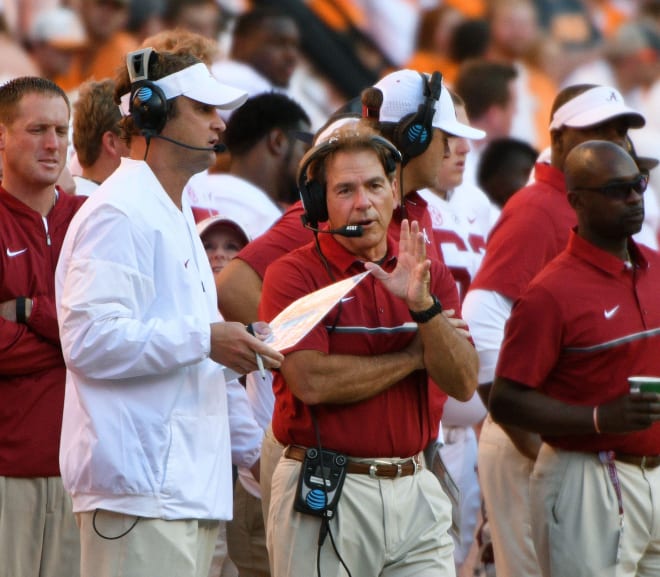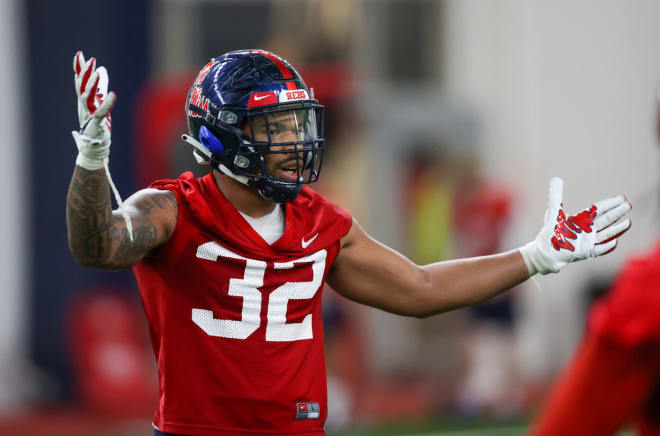Notes: Kiffin and Saban share mutual respect

HOOVER, Alabama — Lane Kiffin speaks of Nick Saban in glowing terms.
The Ole Miss coach has repeatedly said the three years he spent in Tuscaloosa as Alabama’s offensive coordinator rejuvenated his career. On Tuesday, Kiffin publicly thanked Saban for the opportunity at Alabama and said it was a turning point in his professional life.
On Wednesday, Saban took his turn at the podium at Southeastern Conference Media Days and he returned the favor, going into detail regarding Kiffin’s role in modernizing the Crimson Tide’s offense in the middle part of the last decade.
“We made a tremendous change when Lane came in, and Lane had always been the same kind of philosophy-wise as we were in terms of pro-style football,” Saban said. “And because of what Ole Miss -- and it's ironic that he's at Ole Miss now -- had done and beaten us several times running the spreads, running the RPOs, running the screens and things that are difficult to defend because of the rule of blocking downfield when the ball is thrown behind the line of scrimmage, and we weren't utilizing some of those things, which I thought put us at a disadvantage, and Lane really hadn't done much of that stuff either.
“So when he came in, I said, ‘Look, we want to change this. You need to research this. You're smart. We can do this.’ He actually did implement that and was the first one to sort of change how we did things on offense. It enhanced our opportunity to score more points. So he did a really good job, and I think there's been -- because we're a little different, a lot of people have sort of wondered what the relationship was, but we never really had a bad relationship because this was always a lot of mutual respect for the kind of play-caller he was, the kind of coach that he was, and the job that he did.”
Kiffin left Alabama for Florida Atlantic, where he spent three seasons before being hired at Ole Miss in December 2019.
“I actually said and told the people when he went to Florida Atlantic that Lane will be a better head coach than even he is an assistant because he has those kinds of qualities,” Saban said. “Obviously, he hasn't disappointed in the job that he did there or the job he's done at Ole Miss. So none of this is a surprise to me. And I didn't hear his comments, so I can't comment on those, but I can only say from my perspective how much respect I have for him as a coach.”
Key to longevity? Win.
Saban was asked Wednesday, his 19th appearance at SEC Media Days, about the key to longevity in his profession. Saban said the answer is simple.
“You've got to win,” Saban said. "So what does it take to win? I think that answers the question better than anything. I think you have to have culture in your organization, which probably comes from the mindset of the people in your organization to have goals and aspirations for what they want to accomplish and what they want to do - and I'm talking about players as well here - and they have to have a good understanding of what does it take to accomplish those goals and aspirations to be the best that they can be, and how do they have to edit their behavior to be able to do that and can they have the discipline, self-discipline on a daily basis to execute and do the things they need to do, make the choices and decisions they need to make, so that they can be the best that they can be?
“I think what we've always tried to do for our players is create more value for the players by how we use personal development, academic support, career development, the way we develop football players to create a successful culture for them to see the players before them, in terms of what they bought into, what they did that helped them be successful so the next player has the best chance to buy in to the same things and to that culture so they have the best chance to be successful and the best chance to develop personally, academically, and athletically.
“That's how we try to win, but I think it's probably good players, good coaches, supportive administration that gives you the tools that you need to be able to continue to provide the resources to help the players be successful are all probably key ingredients of that.”
Saban was asked about the Crimson Tide’s approach to newly-enacted NIL laws. On Tuesday, speaking to Texas high school coaches, Saban said his quarterback, Bryce Young, is already approaching $1 million in endorsement/appearance deals.
“I think, first of all, what I said before, anything that I say now, because there's no precedent for it, you don't really know how it's going to affect things,” Saban said. “Players have always been able to work and earn money. That's something that you could do ten years ago, 20 years ago. It's something that I did when I was a player. The college landscape changed to some degree when players got cost of attendance. We made rules that allowed them to go to summer school on scholarship, which we didn't used to have. So most players with this additional money and the opportunity to advance their academic circumstance chose not to work.
"So all we've done is create an opportunity for players to work. The only thing is, the question is because it's not going to be equal, and everything that we've done in college athletics in the past has always been equal. Everybody's had equal scholarship, equal opportunity. Now that's probably not going to be the case. Some positions, some players will have more opportunities than others. And how that's going to impact your team, our team, the players on the team, I really can't answer because we don't have any precedent for it.
“I know that we're doing the best we can to try to get our players to understand the circumstance they're in, the opportunity they have, and how those opportunities are not going to be equal for everybody, and it will be opportunity for our team's success that people are not looking over their shoulder at what somebody else does or doesn't do. But any other comments that I would make about this, with no precedent, no experience, would probably a year from now not be looked on or viewed on as very smart.”

‘Cats pleased to add Jones
Former Ole Miss linebacker Jacquez Jones transferred to Kentucky for his final collegiate season this summer. Jones’ playing time at Ole Miss was likely going to take a hit with the addition of Maryland transfer Chance Campbell and the emergence of several young linebackers on the Rebels’ roster. Jones will likely play a big role at Kentucky this fall.
“Well, he brings an experienced player,” Kentucky coach Mark Stoops said. “It’s definitely an area where we got caught a little bit short, as I mentioned in the opening statement about having the opportunity to fill some holes. With Chris Oats having the injury and being unable to play again this year and with the early departure of Jamin Davis left us a little bit thin.
“Then we had an injury in the spring, season-ending injury in the spring of another inside linebacker. So with that, he brings a player with a lot of experience and leadership, and we needed that at that position. So we're excited to have him.”
Wildcats counting on ‘super seniors’
Kentucky has six sixth-year seniors on its roster this fall, a product of the extra year of eligibility provided to all players due to the COVID-19 pandemic that impacted the 2020 season. Stoops said that experience should serve the Wildcats well in 2021.
“We have six guys that -- I've never used that term, but it's a great term, super seniors, the guys that decided to come back, and we greatly appreciate having that experience,” Stoops said. “There’s six guys that bring a wealth of experience. They've won a lot of football games. They've been to a lot of bowl games and had some success. Hopefully, they'll help us take it to another level and provide the leadership that we need.
I feel like it's also a good time for us. It gives us great balance. Roster management is such a big deal now, with what's going on, again, with the portal and all the transfers and different things. I feel like we have good balance within our six classes now, which is very different, but that will change each year.
Leach avoids vaccination questions
Mississippi State coach Mike Leach was asked Wednesday about his team’s vaccination landscape. As expected, Leach, normally known for his loquacious answers, was short on the subject.
“First of all, we let the doctors handle all that, so I don't have anything to do with that,” Leach said. “We let the guys that know what they're doing handle it.”
Mississippi State isn’t believed to be one of the six teams above the 85 percent threshold — Alabama, Georgia and LSU have confirmed this week they are and a report out of Arkansas earlier in the week reported the Razorbacks were as well — but Leach declined to go into detail. Pressed as to his own personal vaccination status, Leach refused to answer.
“If I was or I wasn't, I wouldn't share it with you,” Leach said. “But again, we leave that to the doctors and anybody's doctor or care provider.”
Lea makes SEC Media Days debut
Clark Lea knows he has a big climb ahead at Vanderbilt. The former Commodore played at the school and knows the roster he inherited in Nashville is nothing compared to the one he left in South Bend, Ind., where he was the defensive coordinator at Notre Dame.
Asked how he’d judge success this fall, Lea said it wouldn’t be strictly wins and losses.
“I don't believe in doing that in any semblance,” Lea said. “We’ll say that every game that we play we'll have a plan to win, and we'll measure our results off our execution of that plan to win.
“There are measurable things that show growth as a team, and there are things that can't be measured. I think both are important. In the end, I'm a competitor, and I didn't come to Vanderbilt to do anything other than win. So for me, it's about how we design this team, how we design our tactics, how we develop as people and as teammates to put ourselves in the best position to win games in the fourth quarter. We can be the best physically and mentally conditioned team in the country. We can impose our will on our opponent late in the game.
“The vision is that there's a fourth-quarter game where we're on our sideline looking across the field at an opponent that is wilting under the pressure that we're applying because we are the best mentally and physically conditioned team in the country, that we know on our sideline that we're ready to pounce, and we understand that their margin for error is so small because of the pressure that we're applying. Those are the kinds of things I'm looking for as we measure performance as we get into the heat of this season, is that ability to find ways to win those games late.”